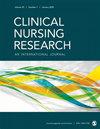大流行病对痴呆症护理和护理人员的影响:定性研究
IF 1.8
4区 医学
Q2 NURSING
引用次数: 0
摘要
在 COVID-19 大流行中,为限制传染而采取的物理隔离措施使得照顾患有痴呆症的老年人变得十分困难。非必要的家访被阻止,家庭护理人员接管了大部分护理工作。我们的研究旨在描述大流行期间痴呆症患者护理人员在提供护理和被护理者方面的生活经历。研究采用了定性现象学设计。采用有目的的抽样方法招募参与者。信息提供者选自初级医疗保健中心、日间中心和社区精神卫生单位。研究参与者包括 21 名护理人员。研究人员通过电话进行了半结构式深度访谈,并收集了现场笔记。研究人员进行了专题分析。用于控制可信度的标准是可信度、可转移性、可依赖性和可确认性。确定了三个主题和六个相关的次主题:(1) 在大流行期间对痴呆症患者的护理,包括封锁,与应对限制的困难、健康状况的恶化以及医疗和社会资源关闭的影响有关;(2) 在中断后为痴呆症患者提供的医疗和社会护理,以及在入院或住院之前从初级护理中获得的护理;(3) 护理者对心理情感影响的看法,以及在护理过程中采取的应对策略。对痴呆症患者的干预措施应该有计划地进行,以防止他们的健康和认知状况恶化,同时也要制定方案,以防止出现健康危机时的压力和减轻照顾者的负担。本文章由计算机程序翻译,如有差异,请以英文原文为准。
Impact of the Pandemic on Dementia Care and Caregivers: A Qualitative Study
Physical distancing measures to limit contagion in the COVID-19 pandemic made it difficult to care for older persons with dementia. Non-essential home visits were prevented and family caregivers took over most of their care. The aim of our study was to describe the lived experience of peoples living with dementia caregivers during the pandemic regarding the care provided and the person cared for. A qualitative phenomenological design was used. Participants were recruited using purposeful sampling. Informants were selected from primary healthcare centers, day centers, and a community mental health unit. The study participants comprised 21 caregivers. Semi-structured in-depth interviews by telephone were used, and field notes were collected from the researchers. A thematic analysis was conducted. The criteria used to control trustworthiness were credibility, transferability, dependability, and confirmability. Three main themes and six related sub-themes were identified: (1) care for the person with dementia during the pandemic, including lockdown, associated with difficulties in coping with restrictions, deterioration in health, and the impact of the closure of health and social resources; (2) health and social care provided to people with dementia after the disruptions and the care received from primary care prior to hospital or residential admission; and (3) the caregiver’s perspective on the effects of the psycho-emotional impact, and coping strategies adopted in caring. Interventions for people with dementia should be planned in order to prevent the worsening of their health and cognitive status, while also developing programs to prevent stress and alleviate caregiver burden in case of health crises.
求助全文
通过发布文献求助,成功后即可免费获取论文全文。
去求助
来源期刊

Clinical Nursing Research
NURSING-
CiteScore
3.40
自引率
5.90%
发文量
107
审稿时长
>12 weeks
期刊介绍:
Clinical Nursing Research (CNR) is a peer-reviewed quarterly journal that addresses issues of clinical research that are meaningful to practicing nurses, providing an international forum to encourage discussion among clinical practitioners, enhance clinical practice by pinpointing potential clinical applications of the latest scholarly research, and disseminate research findings of particular interest to practicing nurses. This journal is a member of the Committee on Publication Ethics (COPE).
 求助内容:
求助内容: 应助结果提醒方式:
应助结果提醒方式:


